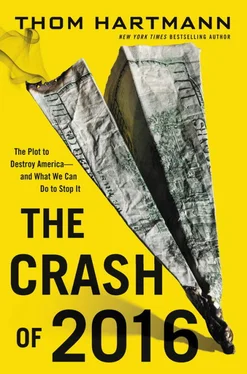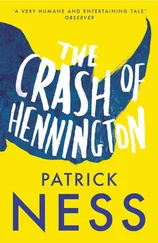Thom Hartmann
THE CRASH OF 2016
The Plot to Destroy America—and What We Can Do to Stop It
To Tim Carpenter, cofounder of Progressive Democrats of America, and a true champion of democracy and the people
This book would not have been possible without the help of my friend, colleague, and collaborator in so many things, Sam Sacks. From ideas and suggestions to research to extraordinary editorialist assistance, Sam has helped make this book what it is. Indeed, I’m the author of this book, but you’ll find Sam’s hand and deft touch throughout it. Partly because of my schedule, but mostly because of Sam’s brilliance, I’ve never so relied on a private editorial assistant for any other book I’ve written. It’s been a pleasure and an honor working with you, Sam. Thank you!
Bill Gladstone, my agent and the CEO of Waterside Productions, also helped bring this book into being, from concept to final publication, and has shepherded it along these many months. Bill has been working with me for decades on my books and is always a source of encouragement, inspiration, and good, solid, sane advice.
The great folks at Hachette and Twelve have been with us on this book from beginning to end, and I’m so grateful for their help, encouragement, and bringing this book to publication. They include: Sean Desmond, Libby Burton, Mari C. Okuda, and Cary Goldstein.
I’m not the first or only author to follow the trail of the themes of this book. There have been many over the years, and many have influenced my thinking. In particular Dr. Ravi Batra, author of The New Golden Age and Greenspan’s Fraud and a frequent guest on my radio show, has taught me a lot. As have Richard Wolff, Robert Reich, Paul Krugman, David Korten, David Cay Johnston, Lori Wallach, Ralph Nader, and so many other brilliant writers, thinkers, and economists I’ve had the privilege of knowing and interviewing over the years that I’m reluctant to start a longer list of names for fear I will miss some.
Finally, without my wife, Louise Hartmann, none of my many books would have been finished over these decades. Thank you, Louise, for being both my life partner and my business partner!
INTRODUCTION
Canvas Moon America
Your home is regarded as a model home, your life as a model life. But all this splendor, and you along with it… it’s just as though it were built upon a shifting quagmire. A moment may come, a word can be spoken, and both you and all this splendor will collapse.
—Henrik Ibsen,
A Doll’s House , 1879
Iwas around ten years old, and a total science fiction junkie. Amazing Stories —a pulp magazine of science fiction short stories, commentary, and science news—arrived every month, and that meant that on that day all homework and play were forgotten. These were some of the most brilliant stories, written for a penny or so a word by people such as Robert Silverberg, Jack Vance, Poul Anderson, and Frank Herbert, who would go on to become the biggest names in the field of Fantasy and Sci-Fi.
And one particular story haunted me for years. Eight years later, when the first men landed on the Moon, that story was brought back to me as if I’d read it the day before.
In the story, a group of astronauts are finally, for the first time, going to blast off from Earth and circle the Moon. It had never been done before, and because our moon doesn’t itself rotate on its axis like we do relative to the Sun, but instead circles us with a single side always facing us, nobody had ever before seen the “dark back side of the Moon.” These men would be the first in human history to do so.
The rocket roared to life from the launchpad, the astronauts chatting with Mission Control as they hurtled toward the Moon. When they got close enough, they let the Moon’s light gravity grab their space capsule and, with a few deft rocket thrusts, they put themselves into orbit around it. They were unbelievably excited, as were the NASA folks on the ground, chattering back and forth about what they hoped and expected to see.
Was the dark side of the Moon identical to the front, or was it more mountainous? (We now know it is the latter.) Might there be frozen water there, since it has a different exposure to the Sun? Might there even be wreckage there from ancient astronauts, or something else exotic like that? Anything was possible!
As the astronauts began their turn around to the back side of the Moon, Mission Control told them they’d lose communication because the giant mass of the Moon would block their signals, so they prepared for radio silence. But as they made the turn, they could still hear Mission Control.
What they saw as they glimpsed behind the face of the Moon we see on full-moon nights brought an audible gasp from all of them.
One picked up the microphone to radio the ground and tell the horrible story. Another knocked the microphone from his hand with a warning gesture. They continued to circle around the back side of the Moon, and the view became even clearer, ever more undeniable.
“Should we report it?” A debate—virtually a fistfight—broke out in the capsule. What would it mean for earthlings? What if nobody believed them? What if they were quarantined upon returning and imprisoned or sent to a mental hospital?
I remember what they saw that so horrified the astronauts.
The back side of the Moon was missing. They were looking into the concave half ball of the front side of the Moon, which was made of canvas stretched over an elaborate superstructure of two-by-fours, nailed together like the scaffolds that held up roller coasters from that era.
Who Stole the Back of the Moon?
This sci-fi story from my childhood also tells the story of America today on the verge of the Crash of 2016.
On the surface, everything seems OK. Our politicians still talk about promise, hope, and change, and we applaud and feel inspired. The world still uses our money. We still have the strongest military in the world. And our standard of living is still far better than the Third World’s (though worse than most of the developed world’s). We’re still by far the wealthiest nation in the world, with too many billionaires to count: Bill Gates, Warren Buffett, Charles and David Koch, Mark Zuckerberg, and so on. We still have civility in the streets. We have reality TV and fancy (gas-guzzling) cars. We still vote (those with a driver’s license and birth certificate can, at least).
As long as you don’t look too closely at our nation, things seem under control—the United States looks whole. The economically, militarily, and scientifically superior United States, as we’ve come to know it in the past eighty years, seems intact—not only for the whole world to see from afar but also for those of us who live here.
But when you go around to the “dark back side” of the nation, you see the shocking truth. There you see a nation whose core fundamentals have been hollowed out, replaced by balsa-wood stilts and wrapped in a frayed canvas of nationalism and bravado—a cloak similar to that worn by nearly every great superpower that has ever existed on the planet just before its own eventual collapse.
Unlike the canvas Moon, the United States was once full and complete. Many of us still have memories of that golden age of the middle class throughout the 1940s, ’50s, ’60s, and ’70s.
Читать дальше













